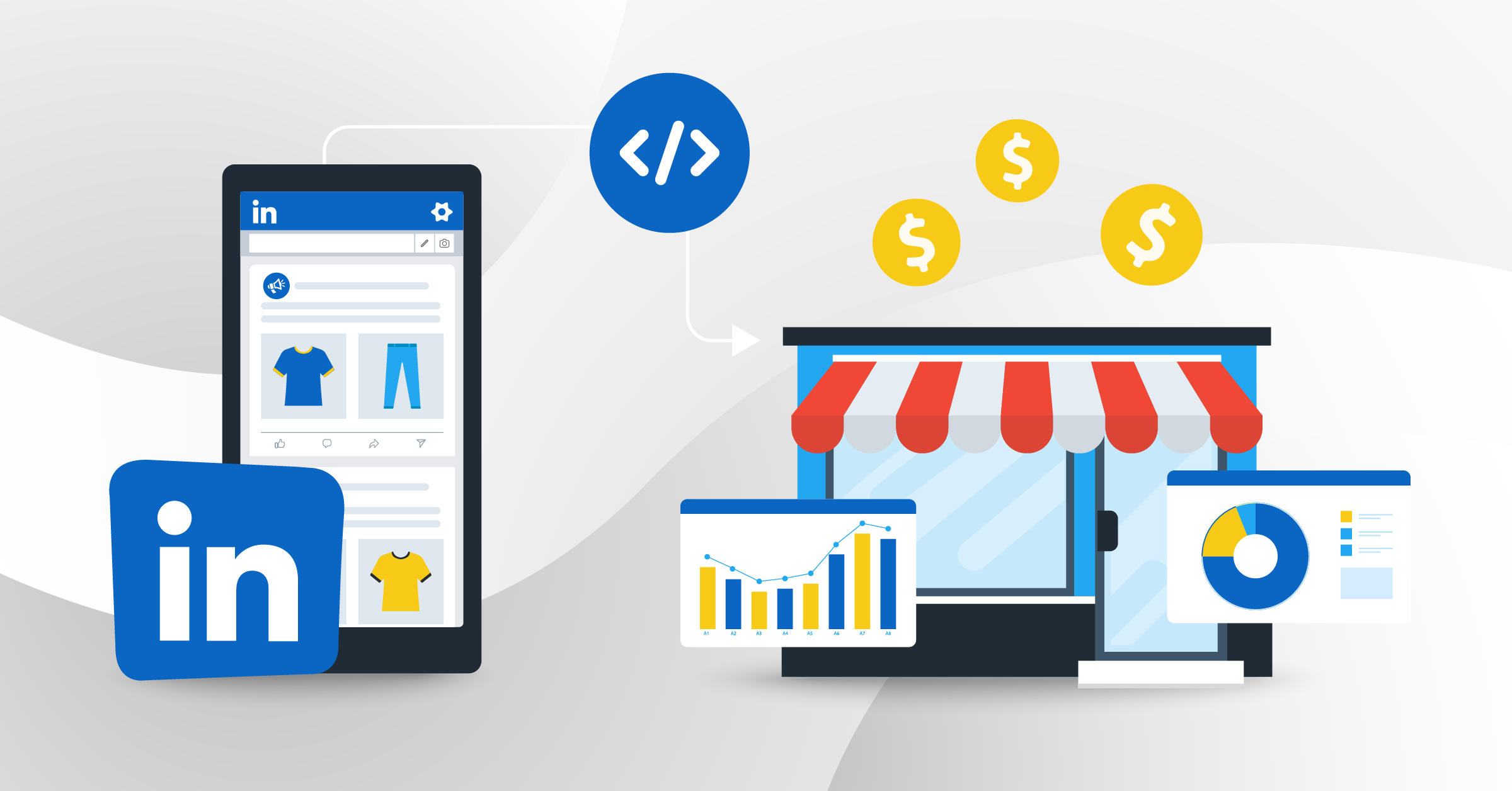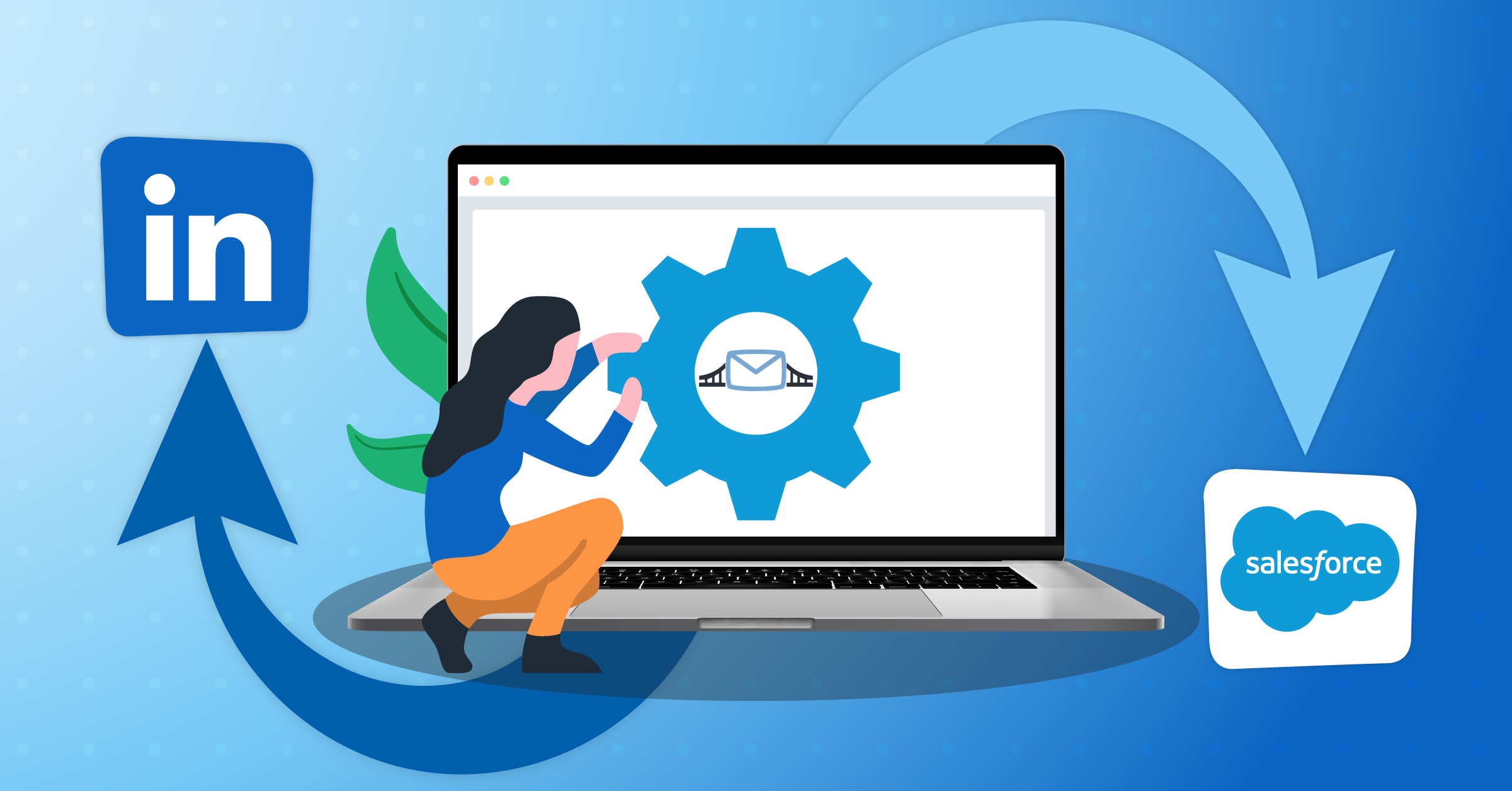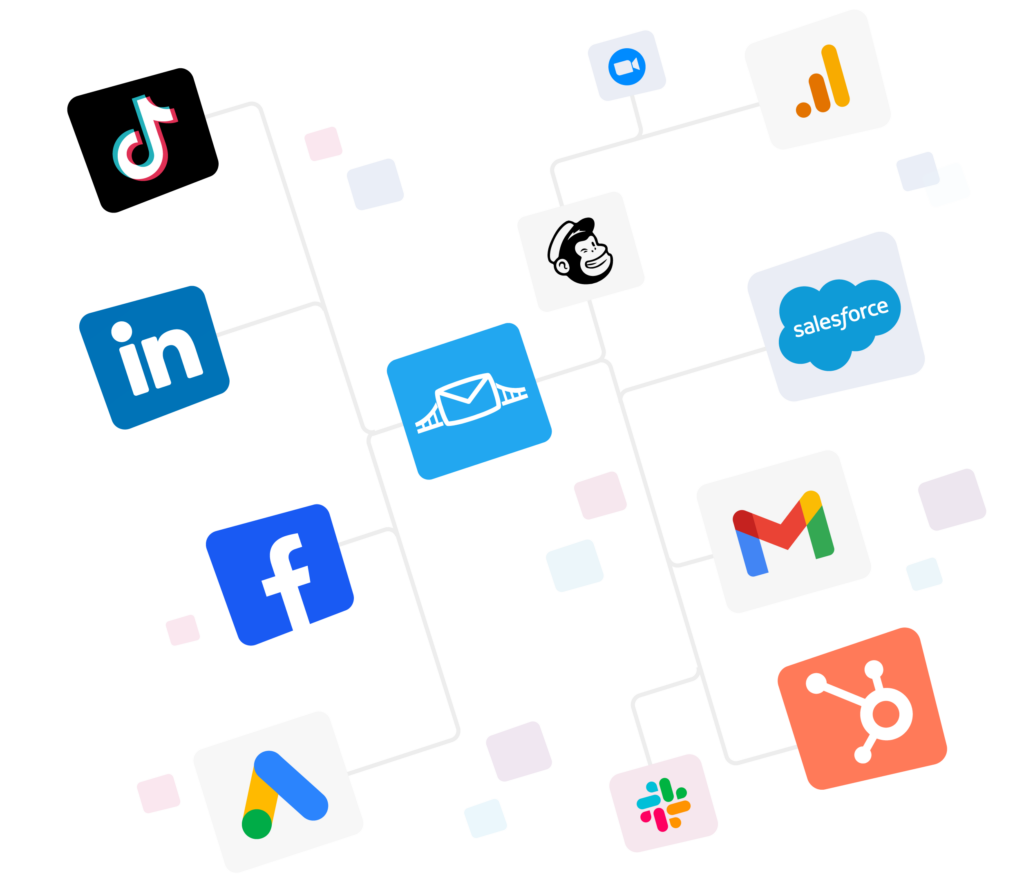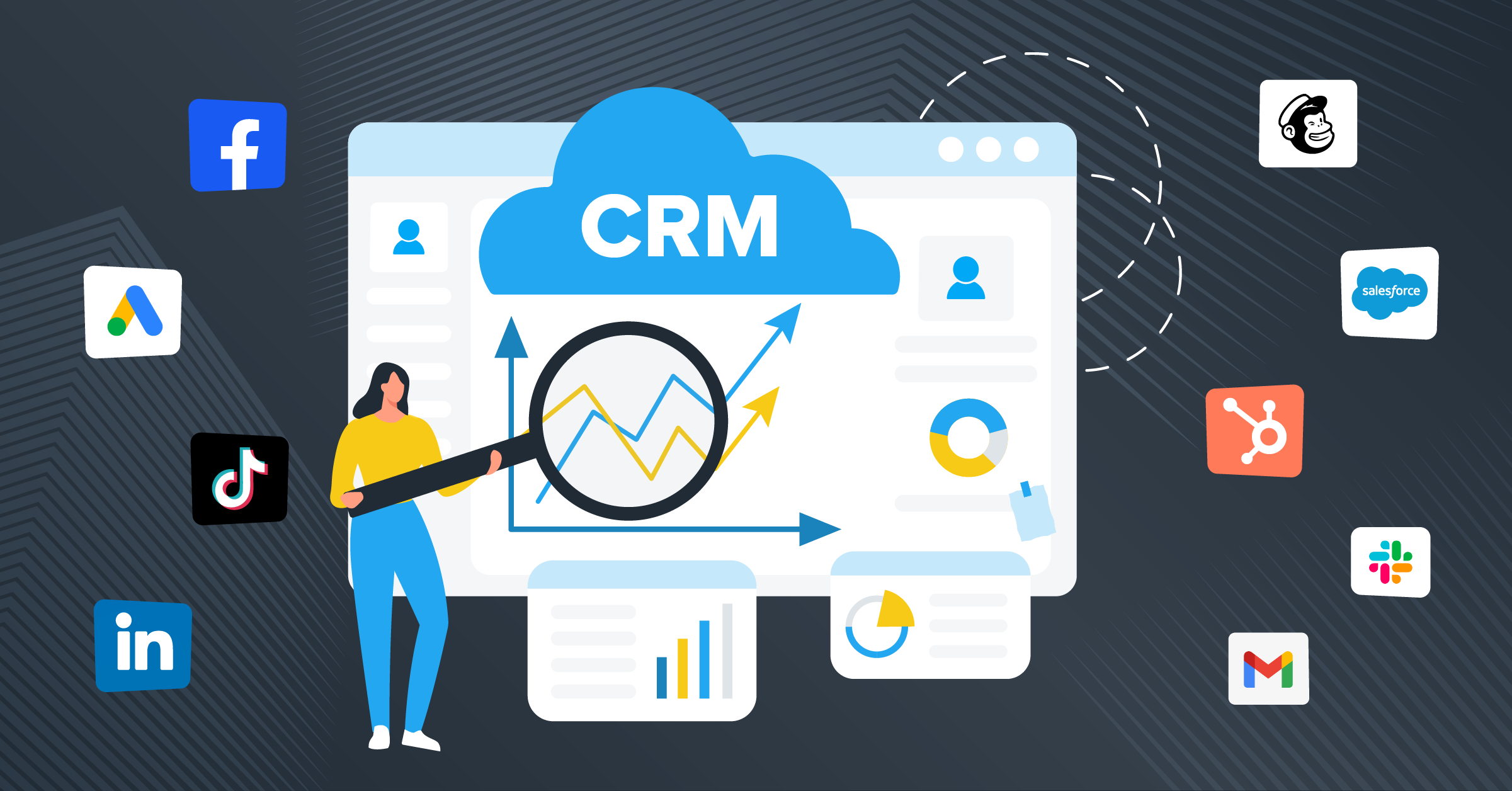
Before automation was so readily available, most companies manually moved their data from singular or multiple applications to their CRM (customer relationship management) systems.
While some companies still operate this way, the majority have found it to be complex, as well as inefficient.
Moving back and forth between applications is a time-consuming process, leaving too much opportunity for discrepancies and other mistakes that can impede the smooth transfer and interpretation of data.
In today’s climate, operations are ever-changing and extremely fast-paced. Businesses need solutions that offer the smooth streamlining of various processes, most importantly, data transfer.
This information, which influences every action taken toward a customer, must be automated in order to achieve maximum efficiency.
Customer nurturing and acquisition can be lengthy processes in themselves. So, your data management process should not require the same time investment.
In this article, you will discover the best CRM integrations, high-performing strategies to go with them, and how LeadsBridge can streamline your data transfers between your CRM and the rest of your marketing stack.
What is a CRM Integration?
A CRM integration is a tool for data orchestration. It uses a data bridge to connect your chosen CRM system with a third-party application, allowing for the automated connectivity of data between the two.
These third-party applications can include email, social media, or advertising platforms, to name a few.
Benefits of connecting integrations with a CRM
Linking these integrations with your CRM can positively impact your business in a multitude of ways, including:
Increased functionality
The automated data transfer between an application and your CRM eradicates the need for manual information input. This enables you to improve your software functionality and take a more refined approach to your data management process.
Enhanced customer insight
Having concise data in a central location gives way to a more comprehensive view of the customer journey. Increasing the visibility of successful touchpoints and advertising spend allows businesses to make better informed decisions.
These decisions lead to an enhanced, targeted customer experience, which can eventually transform into conversions.
Data transfer on autopilot
The automated data transfer between an application and your CRM eradicates the need for manual information input. This enables you to improve your software functionality and take a more refined approach to your data management process.
In addition, CRM offers a unique feature of effective lead management. In turn, this system enables employers to manage the lead contacts efficiently and track the status of every lead. The result is higher productivity and streamlined work management.
Improved productivity
By cutting down on repetitive manual tasks, you can channel your time and effort into actions that hold weight in acquiring conversions.
This focus can be on deciphering which actions incline a customer toward purchasing and re-strategizing based on data provided by your CRM connections.
Integration strategies for your CRM
You can further strengthen the value of a CRM integration. Using the right strategies for your business objectives allows you to get the most out of the data you have collected.
When first familiarizing yourself with these connections, it can be challenging to interpret which tactics are best. So, we have provided a number of options for you to consider.
Capture data with lead generation forms
There are many ways for a prospect to interact with your business, be it via social media, paid Google advertising, or your official website. You must have the essential tools to capture that interest immediately, wherever the prospect may be.
One effective method of acquiring this essential data is to integrate a lead generation form across all platforms where your business has a presence.
These are contact forms that are filled out directly by the users and used to gather relevant customer data.
The information within these forms can help a business build an engaged database of interested customers, who can then be converted to paying customers with the right nurturing techniques.
Lead gen forms can be placed on your website or directly at the bottom of your paid search ads on Google. Depending on the number of fields, customers will typically need an incentive to complete the contact forms.
When you build lead gen form integrations via LeadsBridge, you will automatically receive a notification when users sign up. In addition, your customer data within your CRM will be updated.
Besides Google, TikTok, and Facebook, LinkedIn is another popular lead generation platform. It’s especially used for targeting B2B decision-makers and professional audiences.
LinkedIn Lead Gen Forms make the submission process easy for your target audience through pre-filled lead forms with quality data.
When these forms are combined with LeadsBridge integrations, you can seamlessly convert simple LinkedIn members who interact with your ads into hot leads.
Amplify social media marketing data
As of January, there are a staggering 5.43 billion social media users worldwide. This figure also highlights the already established importance of social media in the advertising ecosystem.
Customers are overloaded with marketing communications daily. So, it should be a priority to ensure that the data you get from your social media campaigns is used to its full capacity.
Employing advertising extensions, such as Facebook lead ads, to your CRM system can help you gain invaluable insight into your audience’s behavior. This behavior includes which content they found engaging, how long they stayed on your page, and where they visited next.
You want to tailor your targeting strategies with specified content and nurture a lead in a way that is unique to that user. This direct approach shortens your sales cycle, as customers are more likely to convert.
After all, nurtured leads have a 47% higher average order value compared to non-nurtured leads.
Simplify cross-team collaboration
Effective communication with your team and smooth collaboration across departments are integral parts of any successful business operation. When multiple people are conversing on separate platforms, information can overlap and become lost, as well as processes being hindered.
Unifying this cooperation in one centralized location can go a long way in maintaining trackable conversations and functioning interdepartmental activity.
Using a CRM integration like Slack helps teams stay connected by making past and current conversations easy to access. This is especially helpful for sales and marketing, since they usually work toward the same goals and need clear, open communication.
Streamline email outreach
Currently, there are 4.6 billion people around the world that use email as part of their daily communication. This shows why businesses are placing an increased importance on email strategy and providing a budget to match.
Automating your email with a CRM connection goes beyond saving time. It can also be useful for running effective lead nurturing campaigns.
Rather than jumping straight into a sales call when someone shows interest, sending a follow-up email with helpful info and resources can warm them up to your business.
The value of a CRM email integration
Marketing emails clearly play an important role. Now, let’s take a closer look at why linking your email platform with your CRM matters and how it can positively impact your bottom line.
Personalization opportunity
Connecting your email platform with a CRM lets your marketing team send personalized, targeted emails at scale.
This data goes into your CRM. There, you can segment your audience and use custom templates that include things like the person’s name, job title, and past buying behavior or interests.
Reduced workflow complexity
Using a CRM with email automation helps you send out tailored messages at the right time. You can set emails to go out when someone visits your site, signs up, or clicks a link, or whatever else fits your goals.
It also gives you better control over your customer information. All this is to say that the process is more straightforward and leaves less room for mistakes.
Greater lead nurturing
As mentioned earlier, connecting your email platform with a CRM helps with lead nurturing. Not everyone is ready to buy immediately. In fact, about 75% of B2B buyers prefer to do their own research before talking to a sales team.
So, having an email workflow that sends useful info over time can help move them closer to purchasing. For instance, about 80% of businesses say email marketing helps them keep customers.
When your CRM and email strategy work together, you can get more value out of both by using customer data to send the right messages at the right time.
Mailchimp integration
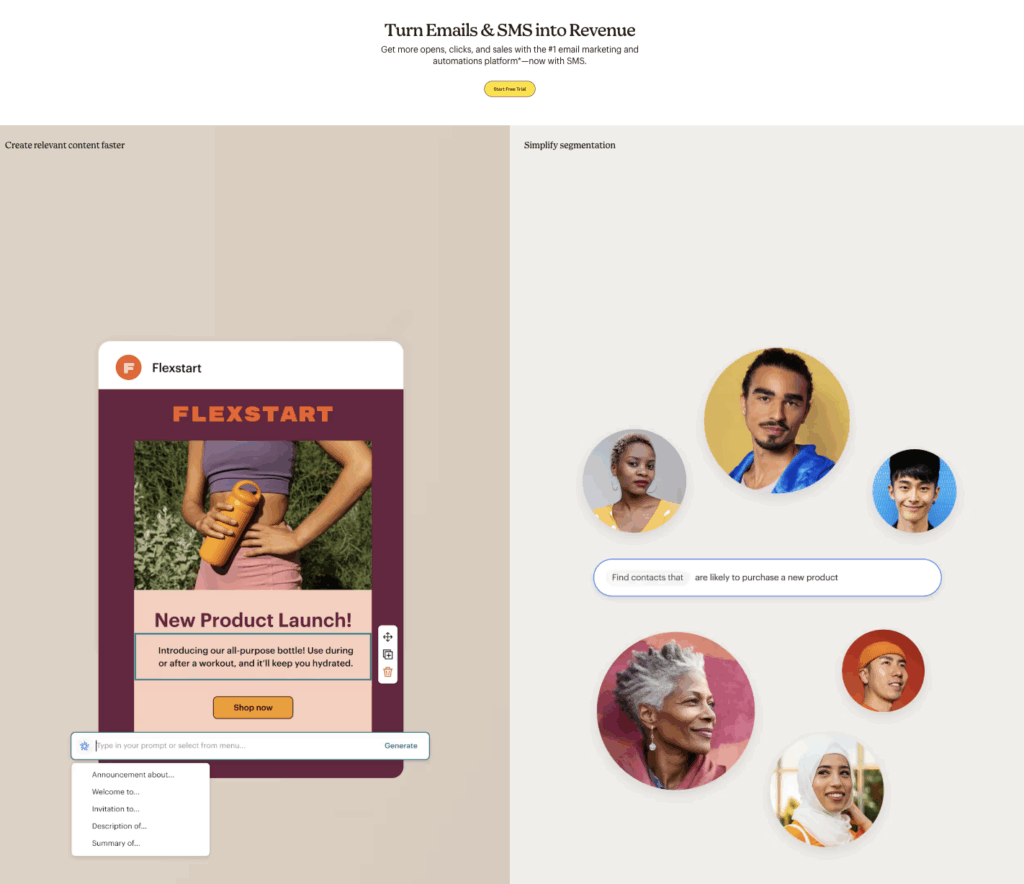
Mailchimp is one of the most popular email platforms in the world. It has around 2.4 million daily active users and sends more than 600 million emails each day.
The platform offers comprehensive features, making Mailchimp CRM integration one of the most robust marketing tools available for your business. Some of the top features include:
Geo-targeting
Mailchimp geolocation allows businesses to estimate a prospect’s location. This means you can target audiences using location filters and also send communications at an appropriate time within a time zone.
This geolocation data is taken from the user’s IP address data when they subscribe to your marketing communication via a Mailchimp sign-up form. The more users interact with your ads, the more accurate the location data becomes.
Analytics and reporting
With advanced analytics features, you can garner deeper insights into customer behavior and advertising performance. This email campaign information enables you to make better marketing decisions, which directly influences conversion rates.
Automating email campaigns with Mailchimp gives businesses greater management of their subscriber queue and sends. Once the content is added and the criteria are established, all emails will be sent in an appropriate sequence.
You can sync your email lists directly with your CRM and map Mailchimp subscribers according to the contacts within the CRM system.
Gmail CRM integration
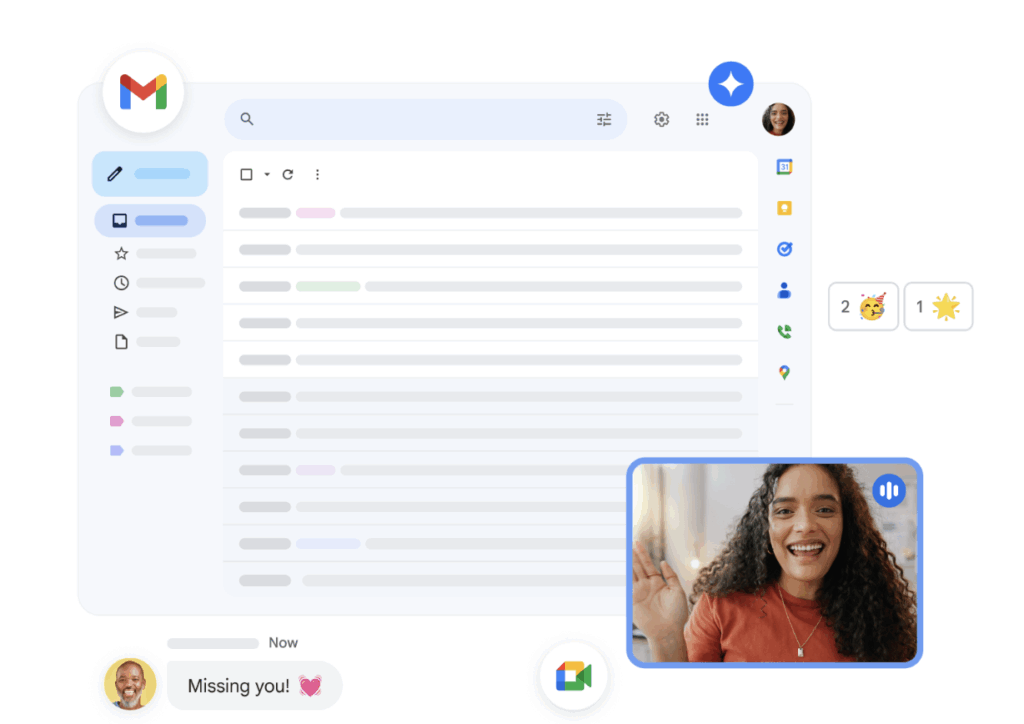
Connecting your Gmail lets you add new contacts and track email interactions in a single dashboard. With a Gmail CRM integration, you can:
Track conversations in one place
Instead of digging through your inbox, all your email threads show up inside your CRM. That means no more switching tabs or losing track of what you said to a customer last week.
Understand what’s working
You can see who opened your emails, clicked a link, or replied right from your CRM. This gives you better insight into what’s actually working and helps you improve your follow-ups.
This is one of the best integrations for its ability to improve customer service and response times. To put that difference in a figure, customers are 80% more likely to buy when they get a personalized experience.
Marketo CRM integration
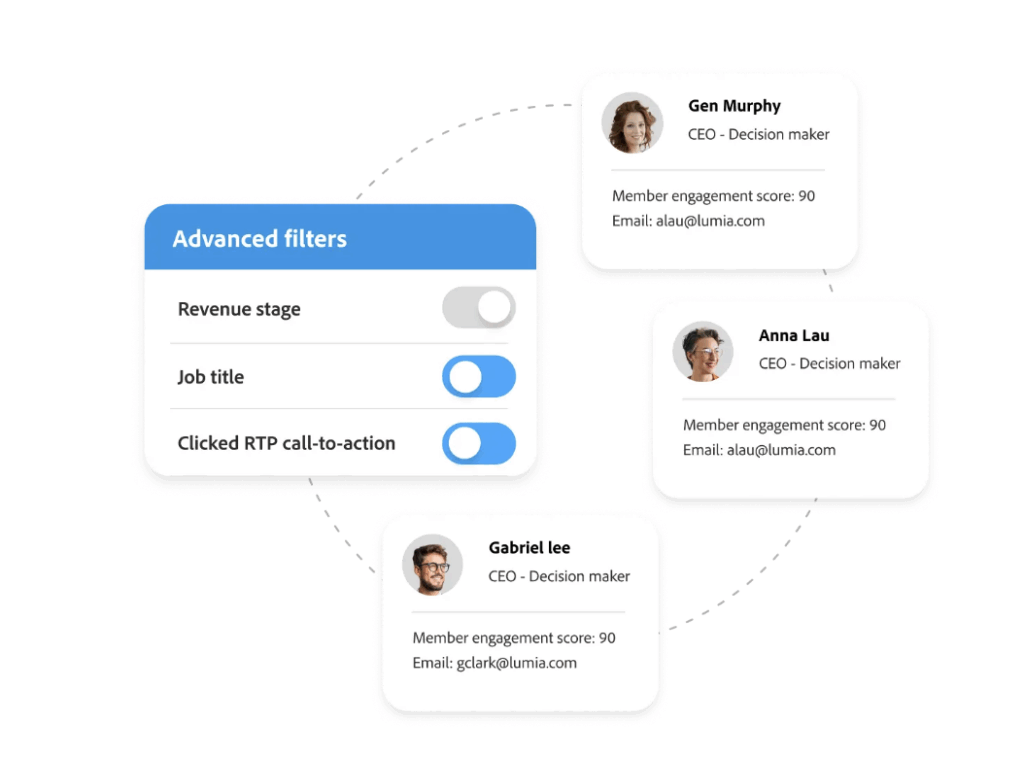
Marketo is a go-to tool for businesses that take marketing automation seriously. It helps you manage leads, create campaigns, and track performance.
When you connect Marketo with other tools through LeadsBridge, you can:
Keep your audiences in sync
No more downloading lists and uploading them somewhere else. LeadsBridge automatically keeps your Marketo audiences updated across platforms like LinkedIn Ads. You always reach the right people with the right message.
Run smarter campaigns
Use your Marketo data to build campaigns based on how people behave, such as what they clicked or when they signed up. This will help you send more relevant content and increase your chances of getting a response.
You can get more info about hows and whys of journey-based advertising here.
Marketo also lets you assign scores to leads based on their actions. If you sync the data you generate automatically, your sales team can know exactly who’s ready to talk and who still needs some nurturing.
HubSpot CRM integrations
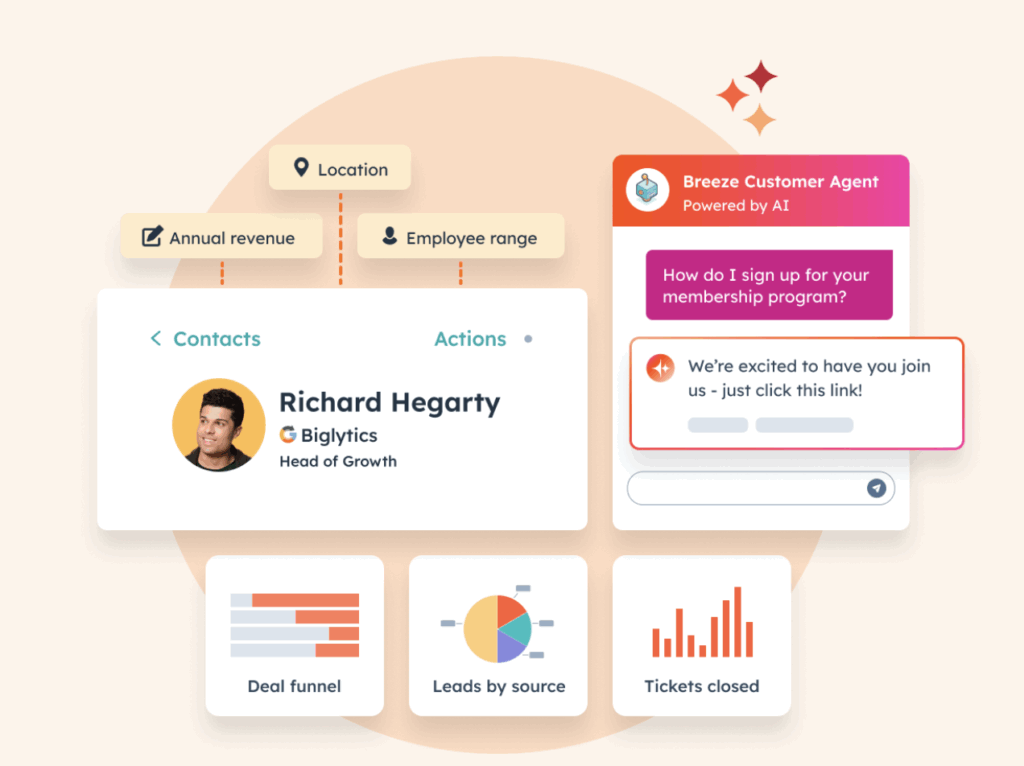
HubSpot makes it easy to manage your contacts, run email campaigns, and track sales. It’s especially popular with businesses of all sizes.
With LeadsBridge, HubSpot can be integrated with a whole lot of tools. These integrations offer so many advantages, including:
Sync contact lists to ads
LeadsBridge can automatically move your HubSpot contacts into Facebook Custom Audiences, Conversions APIs, email and SMS tools, and the list goes on. That way, your ads stay current and target the right people.
Track actions and follow up
When you have an interconnected data stack, as soon as someone interacts with your website, ads, or emails, HubSpot tracks it. You can use that information to create more personal and timely follow-ups or campaigns.
Automate your workflows
Set it up once, and let the tools do the work. You can trigger ads or emails when someone joins your list, fills out a form, or moves to a new stage in your sales pipeline.
Pipedrive CRM integrations
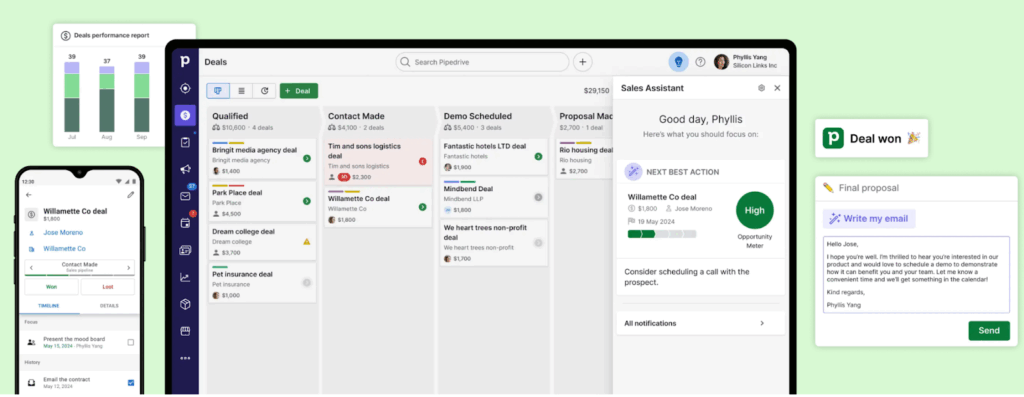
Pipedrive is built for sales teams that want a clean, visual way to manage their pipeline. It helps you focus on deals and close more of them, faster.
When you integrate Pipedrive with LeadsBridge, you get:
Better lead syncing
Any new contact or deal you add to Pipedrive can instantly sync with your ad tools. That also means no more manual updates. Your ads will always target the right leads at the right time.
Smarter retargeting
As deals move through your pipeline, you can trigger retargeting campaigns automatically. For example, if someone goes cold, a well-placed ad might bring them back.
Want to send a thank-you ad when a deal is won? Pipedrive CRM integration lets you easily set rules that make that happen automatically.
Salesforce® CRM integration
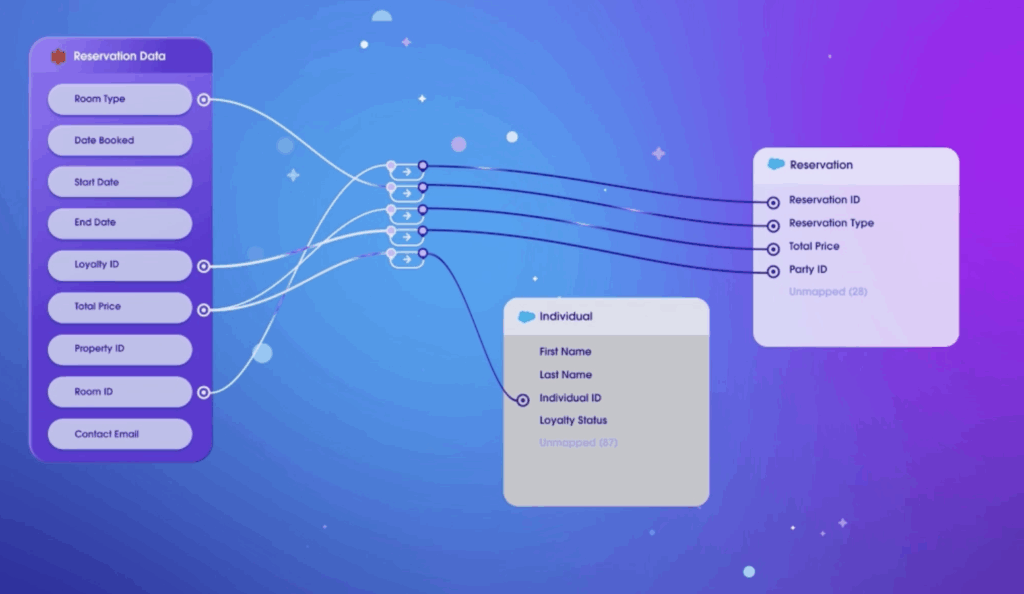
Salesforce® is a powerhouse CRM that helps companies track everything from customer info to sales, support, and beyond. It’s flexible and works great for teams of all sizes.
Here’s how LeadsBridge helps you get more from it:
Real-time updates across tools
Whenever you add or update a lead in Salesforce®, LeadsBridge makes sure that info is reflected in your ad platforms right away. You won’t have to think about syncing lists ever again.
More efficient campaigns
You can create super-targeted campaigns by combining Salesforce® data with your ad tools. No matter if it’s based on lead status, deal size, or interaction history, you’ll always reach the right audience.
Want to move someone into a lookalike audience when they become a customer?
Or pause ads for leads that just converted? With Salesforce® integrations via LeadsBridge, you can build automations that save you hours of manual work.
How LeadsBridge can facilitate CRM integrations
LeadsBridge offers a wide range of comprehensive connections that allow you to bridge the gap between your CRM system and marketing and sales applications.
This streamlines the data between your CRM and advertising platforms, email automation apps and other marketing management tools.
As a Google Premier Partner, LeadsBridge can facilitate seamless CRM integration services with a variety of Google products, including Google Ads, Google Custom Audiences, and Google Offline Conversions Tracking.
Thanks to our direct line with Google, we offer best-in-class support to facilitate your campaigns’ success on the world’s most popular search engine.

Additionally, we are Meta, LinkedIn and TikTok partners. Therefore, we have direct support and instant access to product updates for each of these ad platforms. This enables us to help our customers in a variety of ways if an issue occurs.
Why invest unnecessary time and money in building in-house integrations when you can turn to LeadsBridge to do it for you?
By setting up automated integrations, you are exposing your business to a host of advantages:
- We have a team of expert developers, possessing years of experience and high-tech knowledge, who are ready to help at all times.
- All integrations are regularly updated, meaning you have continuous access to the newest features.
- Our pricing plan can be fully tailored to your needs, ensuring that you are getting optimum value for your money.
Key takeaways
Businesses today have a toolkit bursting at the seams with apps and third-party software. From email to social media, lead generation to customer support, each aspect of your operational ecosystem has its own set of tools.
Managing them all at once can be complicated. CRM integrations work by bringing everything together in one place, giving you an overview of a client’s entire relationship with your company in a single snapshot.
You no longer need to spend your day logging in and out of different apps, which frees up time you can now spend on building customer relationships and bigger-picture goals

























